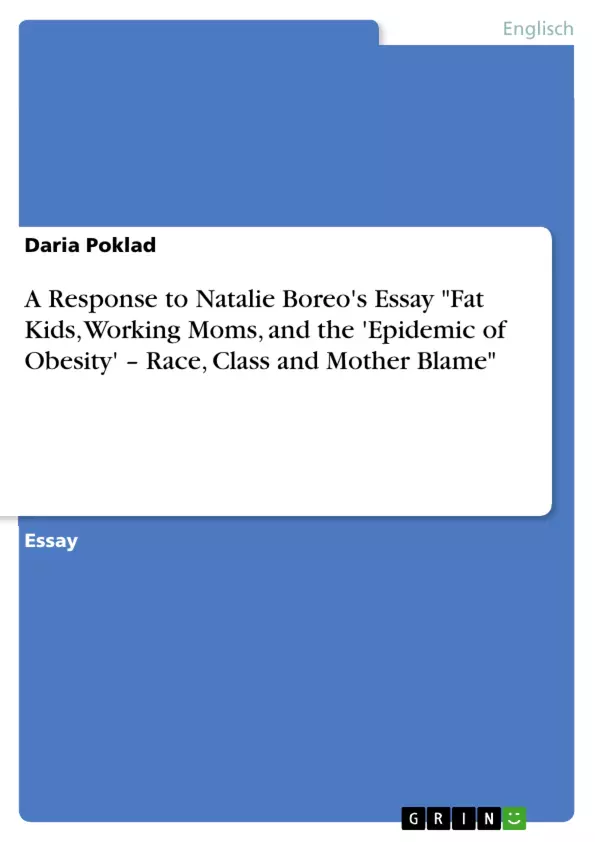In her essay “Fat Kids, Working Moms, and the “Epidemic of Obesity” – Race, Class, and Mother Blame” Natalie Boero discusses the blaming of mothers for the fatness of their children by referring to recent newspaper articles about childhood obesity and preventive programs.
Besides the common and popular explanations for childhood fatness like the consumption of too much fast food, too much time in front of the television and too little exercise, the role of mothers is considered to be another important reason for the “epidemic of childhood obesity”.
This trend, namely the trend of “mother blame” holds mothers and especially working mothers responsible for the weight of their children by bringing the child’s weight in connection to good mothering.
Inhaltsverzeichnis (Table of Contents)
- Response Paper: Fat Kids, Working Moms, and the “Epidemic of Obesity” – Race, Class, and Mother Blame by Natalie Boero
Zielsetzung und Themenschwerpunkte (Objectives and Key Themes)
Diese Arbeit analysiert den Vorwurf der „Mutter-Schuld“ im Kontext der Kinderfettleibigkeit. Sie beleuchtet die komplexen Ursachen und die gesellschaftlichen Implikationen dieser Schuldzuweisung.
- Die Konstruktion des „Mutter-Schuld“-Diskurses in Bezug auf Kinderfettleibigkeit
- Die Rolle von Fat Phobie, Sexismus, wirtschaftlicher Ungleichheit und Rassismus in der Schuldzuweisung an Mütter
- Die Auswirkungen der „Mutter-Schuld“ auf die psychologische Belastung von Müttern und Kindern
- Die Profiteure des „Mutter-Schuld“-Diskurses, einschließlich der Diätindustrie und der Gesundheitsforschung
- Die Notwendigkeit, strukturelle und gesellschaftliche Faktoren in der Diskussion über Kinderfettleibigkeit zu berücksichtigen
Zusammenfassung der Kapitel (Chapter Summaries)
- Im ersten Kapitel stellt Boero den „Mutter-Schuld“-Diskurs im Kontext der Kinderfettleibigkeit dar und analysiert die zugrundeliegende Ideologie. Sie argumentiert, dass die Schuldzuweisung an Mütter von einer Reihe von Faktoren wie Fat Phobie, Sexismus und wirtschaftlicher Ungleichheit beeinflusst wird.
- Das zweite Kapitel betrachtet die Auswirkungen des „Mutter-Schuld“-Diskurses auf Mütter und Kinder. Boero zeigt auf, wie Mütter unter Druck geraten, um den gesellschaftlichen Erwartungen an eine „gute Mutter“ gerecht zu werden, was zu psychischem Stress und Belastung führen kann. Sie analysiert auch die negativen Folgen für Kinder, die durch die Schuldzuweisung an ihre Mütter in einem Kontext der Unsicherheit und Kritik aufwachsen.
- Das dritte Kapitel erörtert die Profiteure des „Mutter-Schuld“-Diskurses. Boero argumentiert, dass die Diätindustrie und die Gesundheitsforschung von diesem Diskurs profitieren, indem sie auf die Ängste und Sorgen von Müttern eingehen und gewinnorientierte Programme und Produkte anbieten.
Schlüsselwörter (Keywords)
Die Arbeit thematisiert zentrale Begriffe und Konzepte wie Kinderfettleibigkeit, „Mutter-Schuld“, Fat Phobie, Sexismus, wirtschaftliche Ungleichheit, Rassismus, gesellschaftliche Erwartungen an Mütter, Diätindustrie, Gesundheitsforschung und strukturelle Faktoren. Sie analysiert die Interaktion dieser Konzepte und die daraus resultierenden Folgen für Mütter und Kinder.
- Quote paper
- Daria Poklad (Author), 2015, A Response to Natalie Boreo's Essay "Fat Kids, Working Moms, and the 'Epidemic of Obesity' – Race, Class and Mother Blame", Munich, GRIN Verlag, https://www.grin.com/document/310858



